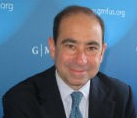Rethinking Mediterranean Security: New Strategies, Partnerships and the role of NATO
OCP Policy Center is pleased to welcome Ian Lesser, Executive Director of the Transatlantic Center in Brussels and Senior Director, Foreign and Security Policy at The German Marshall Fund of the United States (GMFUS) and Charlotte Brandsma, Program Officer, Mediterranean Policy, GMFUS who will give a talk about Rethinking Mediterranean Security: New Strategies, New Partnerships on Thursday 23rd November 2017 at 5:30pm.
Regional crises in the Mediterranean cause ever more pressing security challenges that spill over beyond the region to Europe and the United States. The track record of traditional cooperative security actors like the African Union, NATO, and the European Union in addressing these challenges is mixed, while ad hoc regional and international security partnerships are on the rise and are gaining legitimacy. In light of these new challenges, as well as developments in Turkey and the presence and interests of other actors such as Russia and China, security partners like NATO are rethinking their strategies. What are the latest developments concerning key security challenges in the Mediterranean and what are the most urgent steps of collective response required to tackle them? What changes in international security cooperation are needed, and which are likely? Who should take the lead, and who will?
About the German Marshall Fund of the United States
The German Marshall Fund of the United States strengthens transatlantic cooperation on regional, national, and global challenges and opportunities in the spirit of the Marshall Plan. GMF does this by supporting individuals and institutions working in the transatlantic sphere, by convening leaders and members of the policy and business communities, by contributing research and analysis on transatlantic topics, and by providing exchange opportunities to foster renewed commitment to the transatlantic relationship.
In addition, GMF supports a number of initiatives to strengthen democracies. Founded in 1972 as a non-partisan, non-profit organization through a gift from Germany as a permanent memorial to Marshall Plan assistance, GMF maintains a strong presence on both sides of the Atlantic. In addition to its headquarters in Washington, DC, GMF has offices in Berlin, Paris, Brussels, Belgrade, Ankara, Bucharest, Warsaw, and Tunis. GMF also has smaller representations in Bratislava, Turin, and Stockholm. More information can be found on GMF’s website.
-

Ian Lesser
Executive Director of the Transatlantic Center in Brussels and Senior Director, Foreign and Security Policy, GMFUS
Ian Lesser is Senior Director for Foreign and Security Policy at the German Marshall Fund of the United States, managing activity in these areas across GMF. He also serves as Executive Director of the Transatlantic Center, GMF’s Brussels Office, and leads GMF work on the Mediterranean, Turkey, and the Southern Atlantic.
Prior to joining GMF, Dr. Lesser was Vice President and Director of Studies at the Pacific Council on International Policy. He came to the Pacific Council from RAND, where he spent over a decade as a senior analyst and research manager specializing in strategic studies. From 1994-1995, he was a member of the Secretary’s Policy Planning Staff at the U.S. Department of State, responsible for Turkey, Southern Europe, North Africa, and the multilateral track of the Middle East peace process.
A frequent commentator for international media, he has written extensively on international policy issues. His books and reports include Morocco’s New Geopolitics: A Wider Atlantic Perspective (2012); Beyond Suspicion: Rethinking US-Turkish Relations (2007); Security and Strategy in the Eastern Mediterranean (2006); Turkish Foreign Policy in an Age of Uncertainty (2003); Greece’s New Geopolitics (2001); and Countering the New Terrorism (1999).
He is also a member of the Council on Foreign Relations, the International Institute for Strategic Studies, and the Pacific Council on International Policy. He serves on the advisory boards of the NATO Defense College Foundation, the International Spectator, Turkish Policy Quarterly and Insight Turkey, has been a senior fellow of the Onassis Foundation and the Luso-American Foundation, and a public policy scholar at the Woodrow Wilson Center in Washington.
Dr. Lesser was educated at the University of Pennsylvania, the London School of Economics, and the Fletcher School of Law and Diplomacy, and received his PhD from Oxford University.
-

Charlotte Brandsma
Program Officer, Mediterranean Policy, GMFUS
Charlotte Brandsma joined GMF in 2011. Based in Brussels, she manages GMF’s work on the Mediterranean region, North Africa and the Middle East. Her main focus is on EU and U.S. relations with the Mediterranean, NATO, the future of EU-Turkey relations, and energy security and geopolitics in the Levant. Among other, Charlotte is in charge of organizing GMF’s Mediterranean Strategy Group and GMF’s work on Eastern Mediterranean energy. In addition, Charlotte is a member of the OSCE New-Med research network and a 2017 Turkey-Europe Future Forum Fellow at the Mercator Stiftung in Berlin. Prior to joining GMF, Charlotte worked for the Dutch Ministry of Foreign Affairs in Brussels on the European Neighbourhood Policy, human rights, and migration policy. She holds a bachelor's and master's in international relations from the University of Groningen in the Netherlands. Charlotte speaks Dutch, English, French, German, and basic Arabic and Spanish.









